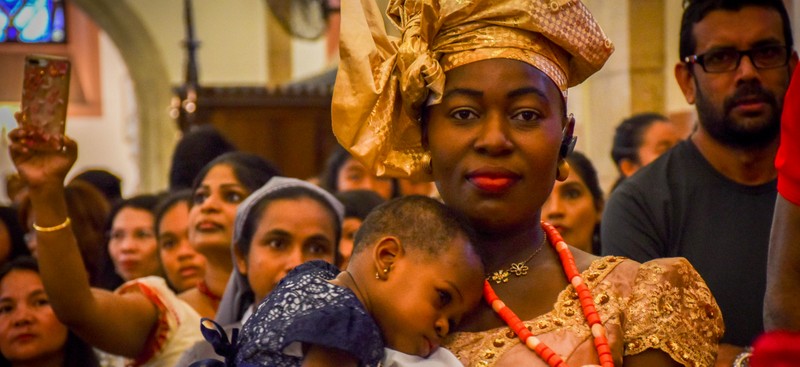JAFFA – On Saturday, September 21, 2019, at the Church of St. Anthony in Jaffa, the World Day of Migrants and Refugees 2019 was celebrated. Numerous community representatives of many foreign minorities in Israel participated. Archbishop Pierbattista Pizzaballa, Apostolic Administrator of the Latin Patriarchate of Jerusalem was the principal celebrant of the Holy Mass.
The Word Day of Migrants and Refugees was instituted by the Catholic Church over one hundred years ago, in 1914, and since then until last year (when its date was fixed by Pope Francis for the last Sunday of September) it was celebrated on a variable date. At the time, migrants were mainly Europeans, men and women in search of more dignified living conditions, willing to leave everything for a better future in the “New World”, represented mainly by the Americas.
This initiative, which reveals the Church’s concern for the different categories of vulnerable persons on the move, is an occasion not only to pray for the challenges that this phenomenon calls to be addressed, but also to make us all more aware concerning it and the opportunities it can offer.
The Church has demonstrated, in very difficult times, that it knows how to feel and respond to this type of request, demonstrating a far-sightedness explainable only by recognizing the contribution of Grace on its way.
The United Nations has, in turn, understood the importance of the theme, announcing The World Day of Refugees on June 20 each year, but only since 2001, on the 50th anniversary of the approval by the Convention relative to the status of Refugees.
Pope Francis chose the theme for this year’s celebration: “It’s not only about migrants,” aimed at showing us our weak points and assuring us that no one remains excluded from society, whether a longtime resident citizen, or newly arrived.” It is a need as timely as ever in each country that welcome migrants, Israel included.
The Word Day of the Migrants and Refugees 2019, scheduled for September 29, was brought forward in the Holy Land to Sunday the 22nd so that it does not coincide with the Hebrew New Year (Rosh Hashanah). At the Holy Mass held in Jaffa, the Liturgy of the Word of the XXVI Sunday in Ordinary Time, that of September 29, was followed.
A wonderful atmosphere accompanied this event; the day began with the Holy Mass in a church packed with representatives of groups hailing from all the world and residing in Israel, in a picturesque setting, rich with color, song and dance. The groups present were of the most diverse communities and Christian minorities in Israel: Filipinos, Eritreans, Ethiopians, Romanians, English and Francophone Africans, Indians, Sri Lankans, South Americans, Sri Lankans and many others.
Concelebrating with Archbishop Pizzaballa were Bishop Giacinto-Boulos Marcuzzo, Patriarchal Vicar for Jerusalem and Palestine, and Fr. Rafic Nahra, Patriarchal Vicar for Hebrew-speaking Catholics and Vicar for Migrants and asylum seekers. Nearby, at the side altars, numerous chaplains and priests responsible for the various migrant communities were present, among them Fr. David Neuhaus SJ, former vicar for Hebrew-speaking Catholics, and Father Augustin Pelayo Fregoso, Franciscan parish priest of St. Anthony. Also present was Archbishop Leopoldo Girelli, Apostolic Nuncio in Israel, who was seated in the first row next to the Philippine Consul General, Mr. Randy Arquiza.
In his homily, Archbishop Pizzaballa first expressed his happiness for the large number of adults and children present in the Church, and then commented briefly on the Gospel of the day that narrated the episode of Lazarus and the rich man, simply defined as such, with a proper name. The Archbishop did not fail to point out the obvious similarities between the Gospel theme and that of the World Day of Migrants. He recalled, as in all the world, we are witnessing a great debate on the question of migrants, with theories and positions taken for or against the flow of migrants and on how this phenomenon evolved. “But the Gospel” he added, “does not enter into the merits of these discussions. It is not an academic theory. It simply tells us that the Lazarus of all times, who lives at our door and who has only crumbs to live, cannot be unseen. We cannot ignore him, reject him. The theories on the phenomenon of migration and the other securities on which we base our decisions cannot justify the refusal to recognize the Lazarus of today.” And concluding: “We are Church, that is, a community of believers in Christ who made the Gospel his rule of life. If Lazarus knocks on our door, we cannot not to help, not to listen to him. The Gospel commands us.”
The Holy Mass was enlivened by the different choirs of the migrant communities: the mixed choir of St. Anthony, the choir of the community of the Pastoral Center Our Lady of Valor in South Tel Aviv, and choirs of the Indian, Sri Lankan, African, Romanian and Ethiopian Ge’ez Rite. The prayers of the faithful were recited in different languages emphasizing diversity and all expressed the desire for peace and justice.
At the end of the Mass, the Apostolic Administrator and the other concelebrants were led in procession to the salon of the school, on the parish premises, where they attended a cheerful and colorful cultural program, and where all the major groups present at the event performed traditional dances. Lunch was also offered in the courtyard of the parish, prepared by various representatives of the different communities.
Later that day, Archbishop Pizzaballa celebrated the Holy Mass for the Hebrew-speaking Catholic Community of the city at the Church of St. Peter in Jaffa.






